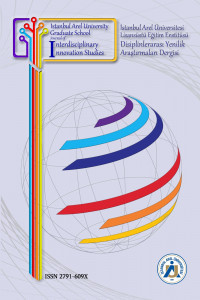“Hayatta kalmak yetmez”: Mandel’in pandemik romanı Station Eleven’da kıyamet sonrası bakış açısı
Pandemi edebiyatı yazarları “sonun” insan yaşamının birçok alanında önemli değişim dönemleri gösterdiği ve ilgili olanların yeni varoluş biçimlerinin yerini aldığı konusunda hemfikirdir. Böyle bir düşünce, kıyamet sonrası toplumların yeniden inşasına yol açmıştır. Bu nedenle, bazı edebi eserler, distopik bakış açıları yerine toplumun yeniden inşasının iyimser veya ütopik tarafına odaklanır. Bu bakış açısına uygun olarak Emily St. John Mandel'in Station Eleven (2014) romanı, okuyucuları, 20 yıllık bir aradan sonra yüksek umutlu toplumların yeniden inşasına dayanan, birçok yönü ile felaketi ve çöküşünü ortaya koyan yeni bir değişim biçimine götürüyor. Roman, kıyamet sonrası insanların başına neler gelebileceğini ve toplumlardaki yıkımın türünü gözler önüne seriyor. Bu nedenle, bu çalışma, Station Eleven salgın hastalık döneminde değişimi nasıl ele aldığını kanıtlamaya çalışıyor. Aynı zamanda, bir salgın hastalık romanında umut ve ütopya incelemesine de giriyor.
Anahtar Kelimeler:
Kıyamet sonrası, salgın hastalık romanı, Station Eleven, ütopya
“Survival is insufficient”: post-apocalyptic vision in Mandel’s pandemic novel Station Eleven
Writers on pandemic literature have concurred that “the end” has displayed the periods of significant changes in many aspects of human lives and that they have replaced new fashions of existence of the relevant ones. Such a mentality of thoughts has led to the reconstruction of societies after the apocalypse. Hence, some literary works focus on the optimistic or utopian side of the rebuilding instead of dystopian perspectives. In line with this perspective, Station Eleven (2014), by Emily St. John Mandel, takes readers into a new form of twist that puts forth catastrophe and its collapse with multiple aspects that rely on the reconstruction of the societies with high amount of hope after a 20 year of break. The novel displays what can happen to the people in post-apocalypse and the type of destruction in societies. So, this study tries to prove how Station Eleven handles the twist with the descriptions of the flu. It also gets into the examination of hope and utopia in a pandemic novel.
Keywords:
Post-apocalyptic, pandemic fiction, Station Eleven, utopia,
___
- [1] Tripney N. “Station Eleven review – Emily St. John Mandel’s rich post-apocalyptic tale.”. https://www.theguardian.com/books/2015/mar/15/station-eleven-review-emily-st-john-mantel-richly-imagined-post-apocalyptic (17.12.2020)
- [2] Mond I. “Book Review: Station Eleven by Emily St. John Mandel”. http://mondyboy.com/?p=6442 (17.12.2020).
- [3] Valby K. “EW book review: Station Eleven, by Emily St. John Mandel”. http://ew.com/article/2014/09/28/station-eleven/ (17.12.2020).
- [4] De Cristofaro D. “Time, no arrow, no boomerang, but a concertina”: Cloud Atlas and the anti-apocalyptic critical temporalities of the contemporary post-apocalyptic novel. Critique: Studies in Contemporary Fiction, 59(2), 243-257, 2018.
- [5] Mandel ESJ. Station Eleven. Alfred A, Knopf. NY, 2014.
- [6] Gomel E. “The plague of utopias: Pestilence and the apocalyptic body.” Twentieth Century Literature, 46(4), 405-433, 2000.
- [7] Griffith C. “Book Review: Station Eleven”. https://tetheredbyletters.com/book-review-mandel/ (17.12.2020).
- [8] Marchand P. “Station Eleven: Review”. https://nationalpost.com/entertainment/books/book-reviews/station-eleven-by-emily-st-john-mandel-review (17.12.2020).
- [9] Kiehn N. “Review of Station Eleven”. https://30northliterarymagazine.com/2016/05/25/review-of-station-eleven-by-emily-st-john-mandel/ (17.12.2020).
- [10] De Cristofaro D. Critical Temporalities: Station Eleven and the Contemporary Post-Apocalyptic Novel. Open Library of Humanities, 4(2), 2018.
- [11] West M. “Apocalypse Without Revelation?: Shakespeare, Salvagepunk and Station Eleven”. Open Library of Humanities, 4(1), 2018.
- Yayın Aralığı: Yılda 2 Sayı
- Başlangıç: 2021
- Yayıncı: İstanbul Arel Üniversitesi
Sayıdaki Diğer Makaleler
Okuduğunu anlamada okuma alıştırmalarının önemi
Nilgün Marmara’nın şiirlerinde renk sembolizmi
7 Katlı betonarme bir binada farklı temel durumları ve zemin rijitliğinin yapı davranışına etkisi
Nuray YAŞAR, Barış TANRIVERDİ, Hayri Baytan OZMEN
Kan ve kan ürünleri hizmetleri yönetimi
“Hayatta kalmak yetmez”: Mandel’in pandemik romanı Station Eleven’da kıyamet sonrası bakış açısı
On dokuzuncu yüzyılda bir bohem: fotoğrafçı ve baloncu Felix Nadar
E-ticarette kayıt dışılık ve kayıt dışılığı azaltmaya yönelik çözüm önerileri
Yöneticilerin, liderlik görevlerine ilişkin algılarının çeşitli sektörler bağlamında araştırılması
Ali AKDEMİR, Safa TANKİŞİ, Özlem AKTAŞ, Burcu YILDIZ, Hakan ÖZTÜRK
